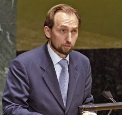Kofi Annan's term as secretary general of the United Nations will end on Dec. 31, and he is trying to make the most of the few months left. Annan has recently completed an eleven-day trip to a dozen countries in the Middle East and Europe, trying to elicit the widest support -- from Israel to Iran -- for the 15,000-strong UN peacekeeping mission to Southern Lebanon. The tour, which Annan described as the most strenuous and demanding of his career, is an attempt to conclude his eight-year tenure with a UN success in the Middle East, a region whose population has tasted far less than its share of the peace, democracy, and wealth that globalization had promised. In other words, the region where the United Nations has most failed its mandate. And quite a failure it has been in the last few years. All of the thorniest issues facing the international community are nested inside the Middle East, and the UN has proved unable even to frame itself as an impartial interlocutor or to diffuse the popular view that Islam is misunderstood and under siege. Iran's quest for nuclear power, the Israeli-Palestinian conflict, the sectarian carnage in Iraq: These are all crises that feed on the gradual alienation of the Muslim populations from the rest of the world, multilateral organizations included.
Might the Next UN Chief Be a Muslim?

